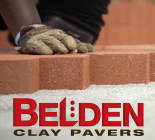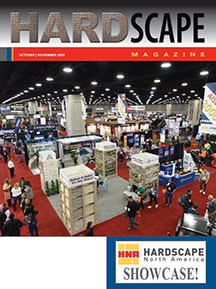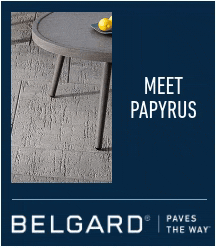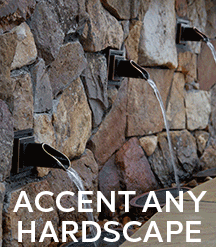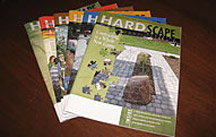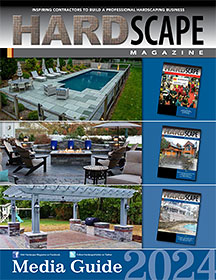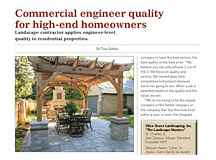Articles written by VK Associates
Troweled Concrete Edging is Generally a Bad Idea
 By Greg Ambrose
By Greg AmbroseOver my 23 years in contracting I have seen things that would make customers cry. The one biggest mistake that is continually repeated is the improper use of troweled concrete to serve as the edge restraint. Troweled concrete has been misused almost since its conception. Yes, it has a use, a very limited one. It can be used in southern climates on pedestrian applications. As for the rest of us who experience frost, we should not even consider it. But, even in southern pedestrian projects, it is usually produced and/or installed improperly.
As I travel the country teaching hardscape installations I inevitably meet a contractor in each market who insists on using this wonder product in the wrong applications. They will do it because it is "cheap and easy," or because it's "concrete" therefore it must be strong. Don't get me wrong, concrete is strong. However, not when it is 2" thick and improperly mixed and applied.
Edge Restraints are Critical
First, let's all agree on the importance of structural edge restraints. They are a critical part of any flexible pavement. They affect both horizontal and rotational interlock in the system. These are 2 of the 3 types of interlock in a segmental pavement.
Structural edge restraints hold your paving units tightly together, enabling consistent interlock across the entire pavement. Without the ability to move laterally, the paving units can support a greater weight and resist spreading from horizontal forces such as tires and settling. This enables the pavement to hold its shape indefinitely.
The Edging Factory
Let's take a tour of the typical troweled concrete edging "factory." Not only have I seen hundreds of them, but I used to have several operating myself. They are located all around your community. Let me explain. Our tour begins with your laborer. He is typically your least skilled person, but he is now running your concrete edging factory. He is in charge of quality control for your hardscape project, and he alone will determine the longevity of your project.
Imprecise proportionsYour laborer will painstakingly measure out the exact proportions of cement to aggregate. This is typically about 5 "shovels full" of aggregate to 1 "shovel full" of cement powder. Do you really think this is weighed and measured down to any degree at all?
A weakness for waterI have seen guys add water to concrete before. Heck I've mixed it before myself. The one thing the laborer wants to do when he is mixing is add more water. It makes it easier to mix, and it mixes faster. What we know about concrete is, the more water you add, the weaker it gets.
A bad mixNow that we have our ingredients in the mixer (wheel barrow) we will start the mixing process. This is where the laborer spends precisely the right amount of time mixing the batch. That is until the foreman says "Are you done yet?" This is the signal that the batch has been thoroughly mixed even if it has been only a minute or 2. Our batch is now going to be installed, ready or not.
Installation Issues
The installation process is almost as comical as the manufacturing process. You can ask 5 different contractors for the right way to install troweled concrete edge restraint, and they will give you 6 different answers! The truth is they are all probably wrong.
The laborer installing the edging is not going to take the time to dig out part of the base. If he does he will probably do it wrong and compromise the integrity of the pavement at its edge. So he just simply trowels the concrete along the edge of the pavement in a triangular fashion. He will need to stay 1" from the top of the pavement, or the homeowner will have a difficult time growing grass.
He needs to be very careful not to get any concrete on the face of the pavers or it will stain. When he does, he will rush to the hose and wash it off. Guess what? He just added more water to the mix.
Then, as the installation nears completion and he's 10' from finishing, he notices he only has enough concrete left to do 6' . What do you suppose he's going to do? Yes, he is going to "make it work!" He's going to stretch his mix and further weaken his edging.
Northern contractors will argue that they do things that make their concrete edging stand up to the freeze-thaw cycle. Some have told me that their edging doesn't fail because they put rebar in the concrete. (I've even had people tell me they put the bands from paver pallets in their mix! Are you serious?) Others will add admixes to reinforce their troweled concrete.
Remember, this was supposed to be "cheap and easy." We are taking valuable time, and spending it manufacturing an inferior product that is not meant to do what we are asking it to do.
Callbacks, Callbacks, Callbacks
Without a doubt, these common practices with concrete edging will lead to future callbacks and repairs. It is like saying to your customers: "Thank you for the business. I will see you next year." We all have better things to do with our time than continue to fix a problem that could have been avoided from the beginning.
Certainly you can agree that regardless of the original price point, it is much more cost effective to show up on the site with a PVC, aluminum, plastic or steel edge restraint and spike it into place. I don't work for an edging manufacturer. I do, however, believe in constructing a pavement that will last indefinitely. Not one that will last until the end of the warranty.
We owe it to the industry to build the best pavement possible. That way we won't have to listen to the homeowner say how they don't want pavers because they fail. Pavers don't fail. We do, as the contractors who install them with the short-minded goal of making it last for the warranty.
Represent the industry with pride. Install your work to generate referrals, not callbacks.
Greg Ambrose is a hardscape installation expert who also understands the business principles of Vander Kooi & Associates. Greg has worked in the hardscape industry since 1984 in contracting, manufacturing and installation/certification training. Call (303) 697-6467 to learn how Greg can help you improve the quality, efficiency and profitability of your hardscape operations.





